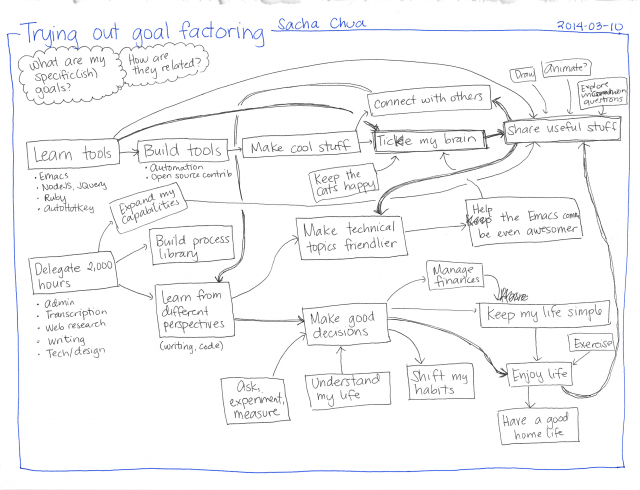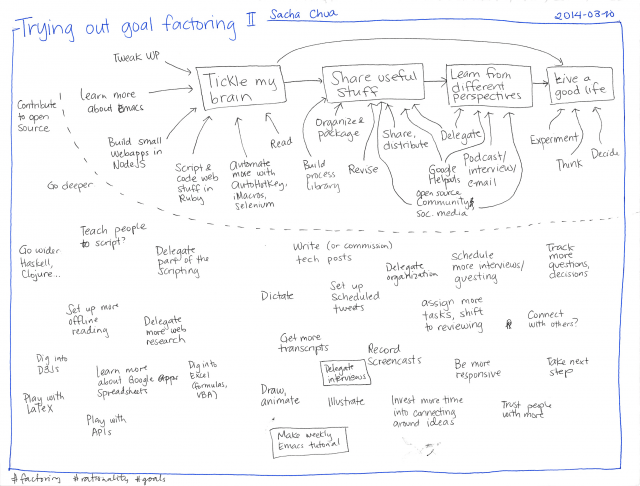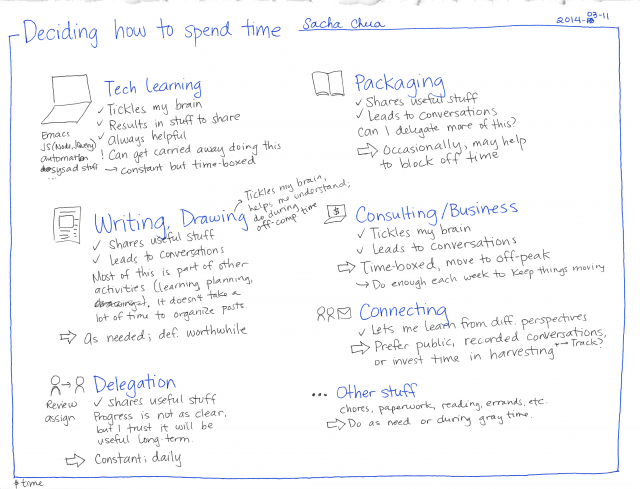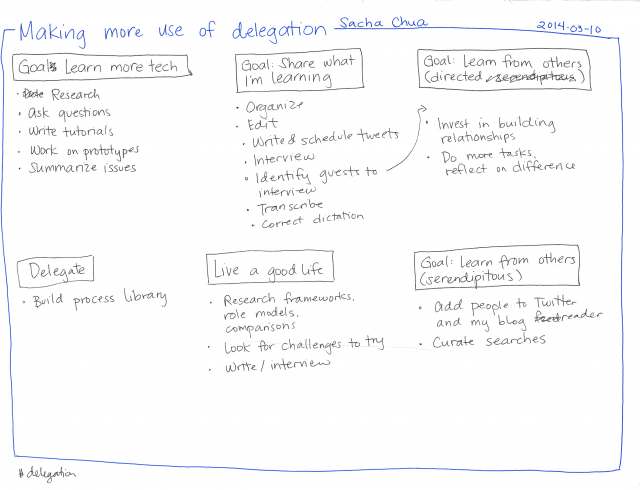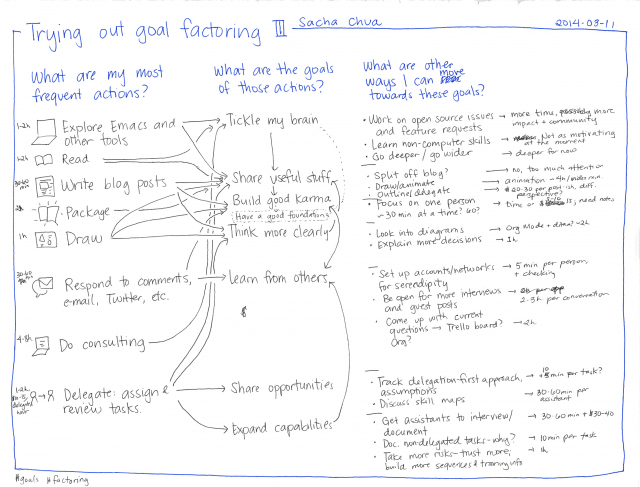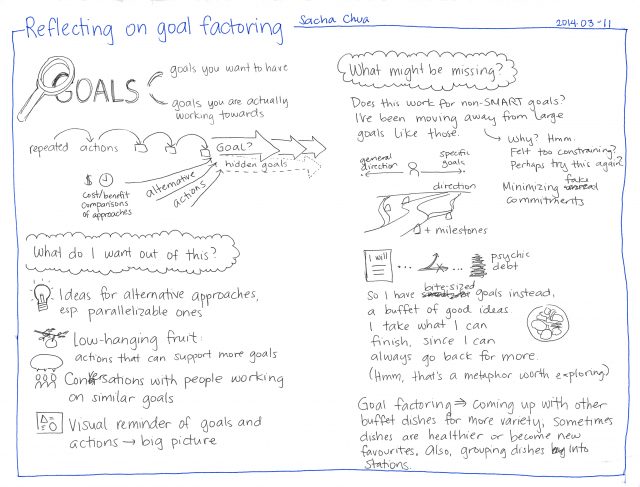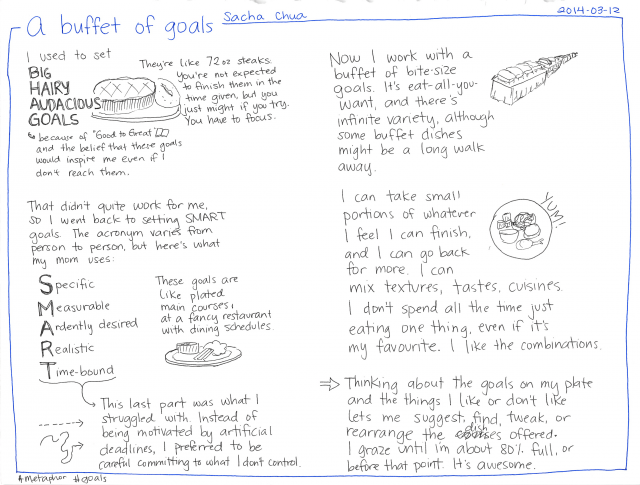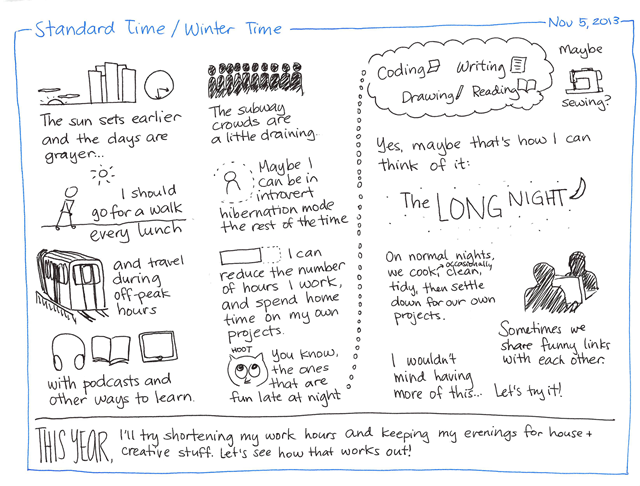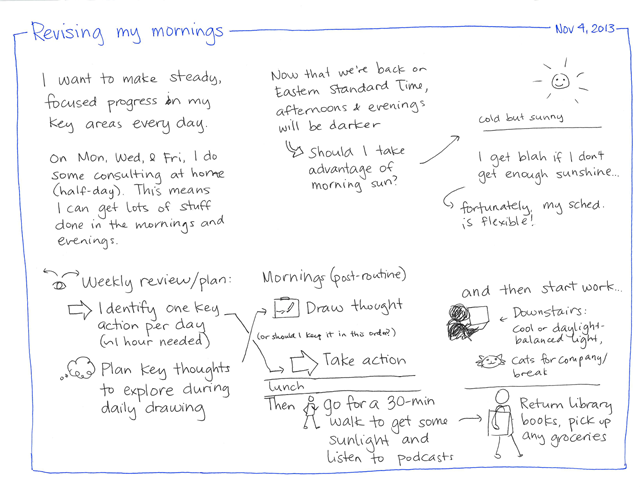Rethinking my time categories: the blurring of business and discretionary activities
Posted: - Modified: | business, experiment, quantified, timeI track my time with medium-level categories (not detailed enough that I'm tracking individual tasks, but not so high level that it's hard to make sense of the data). From time to time, I notice categories drift, or they stop fitting. Consulting is definitely business, but does working on Emacs really belong there? Why is coding classified under business but writing is classified as discretionary time? Most of my categories still make sense a year or two later, but some of them could use more thinking about.
What is business, anyway? I suppose it can include anything related to the earning of money, including support such as paperwork or delegation. Packaging (by which I mean creating e-books and other resources) is part of business, since I earn a small income from that (and pay taxes on it, too!). So is responding to e-mail. Technically, Emacs is related to money, because people have actually booked and paid me for help sessions online (https://sachachua.com/help). I consider programming-related activities to be part of maintaining my technical skills and network. In that sense, coding, web development, system administration, and other geek things are business-related. I distinguish between sketchnoting for client engagements and drawing on my own. Many of my drawings are more along the lines of personal or business planning. Perhaps I should track more under those categories now that I've established drawing as a way of thinking, and shift to using “Business – Drawing” when I'm specifically working on illustrations or improving skills.
Discretionary time includes the stuff I do just for fun and the things I learn about just because (Latin and Morse, for example). Probably the only weird thing in here is that I classify writing as discretionary time. It's fun. Coding is fun too. Coding is more obviously valued, though, so I guess that's why I consider it business time. And also, if I classify writing as coding time, I'll tip over way too often into the “working too many hours a week” zone, when I'm not really doing so.
Maybe a better approach is to classify coding, drawing, and other fun things as discretionary time instead, even if they occasionally result in money. Benefit: I get to celebrate having more discretionary time and a lighter workload. (Yeah, it's all mental anyway…)
Or maybe I need to take a step back and ask myself what kinds of questions I want to be able to answer with my categorical data.
In general, I want to make sure I don't spend too much time working, because I want to force myself to work on my own projects. That's why I track the time spent consulting, doing paperwork, and connecting with people (including responding to e-mail). I usually keep a close eye on my Business – Earn subcategory, since that's the one that can creep up on me unawares. That's fine with my current categories.
I also want to look for patterns in time use. How does spending more time on one activity (and less time on other activities) influence what I do and how I feel? How bursty am I when it comes to different discretionary projects? As long as I'm tracking at the subcategory level, it doesn't really matter what the root category is.
Hmm. Since I'm not actually using the distinction between discretionary and business for reports or visualizations that nudge my behaviour, I can probably leave my categories alone if I remind myself that those ones have fuzzy boundaries. It would matter more if I wanted to set goals for investing X hours a week on business things (or, conversely, spending Y hours on discretionary non-business related things, which is oddly harder). Since I don't care about that at the moment, I'm fine. Also, it's easy enough to reassign the parent categories, so I still leave the door open for analyses at a later date.
As long as I can keep things clear enough in my head so that I feel confident that I can explain to any auditors that yes, my business expenses make sense, I should be fine. I feel a little weird about not having a proper business plan for lots of things I'm working on. I mean, I can write them (or draw business model canvasses, more likely), but I prefer this pay-what-you-want model. Oh, hey, there's an assumption there that I can dig into. People can (and do!) build metrics around freemium or pay-what-you-want models. Maybe I can figure out how to approach this in a business-like-but-still-generous way.
What would a more business-y way look like? I would float an idea to see if it's useful. Then I would make stuff (and sometimes I'd make it anyway, just because). I might actually track conversions, and try things out, and reach out to people and communities. I'd publish little guides and videos, and maybe add a tip jar for smaller pieces of content so that people can “vote” for things they like more.
All things to do in due course. In the meantime, knowing that the path is there means I can leave all of this stuff still filed under the Business category, because it is. Even if it's fun. Writing still feels more discretionary than business-y (even posts like this, for example), so I'll leave that where it is. So no change, but I understand things better.
Do you track your time and have fuzzy boundaries between categories? How do you deal with it?

